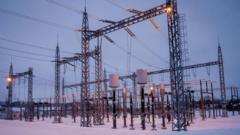The Baltic States have successfully disconnected from Russia’s electricity network, integrating into the European Union’s power grid as part of a long-planned strategy that has gained urgency in light of geopolitical tensions.
Baltic States Achieve Energy Independence from Russia, Join EU Grid

Baltic States Achieve Energy Independence from Russia, Join EU Grid
The historic transition marks a significant leap towards energy security for Estonia, Latvia, and Lithuania.
The article text:
In a landmark shift, the Baltic states of Estonia, Latvia, and Lithuania have officially severed their ties to Russia's electricity grid, successfully integrating into the European Union's energy network. This long-anticipated transition, first proposed in 2007, is viewed as crucial for enhancing European security, particularly following Russia's invasion of Ukraine in 2022.
At a ceremony in Lithuania's capital, EU chief Ursula von der Leyen declared, "Today, history is made. This is freedom, freedom from threats, freedom from blackmail." The Polish President, Andrzej Duda, echoed her sentiments, calling it a "truly symbolic moment" that would bolster the region's security and resilience.
The previous Brell power grid—an acronym for Belarus, Russia, Estonia, Latvia, and Lithuania—was predominantly controlled by Moscow and had long been perceived as a source of vulnerability for the Baltic nations. Although they had ceased purchasing Russian electricity since 2022, their connection to the Brell grid sustained their energy dependence.
Von der Leyen urged NATO to remain vigilant amid fears of potential Russian retaliatory actions. Recent incidents of suspected sabotage involving undersea cables and pipelines have raised alarms, with at least 11 cables reported damaged in the past year and a half. A vessel linked to Russia's "shadow fleet" was implicated in damaging Estonia's primary power connection in the Gulf of Finland. The Kremlin has not responded to inquiries regarding these incidents.
Lithuanian President Gitanas Nauseda called for sanctions against the shadow fleet, emphasizing the gravity of recent developments. NATO, while stopping short of directly accusing Russia, has initiated a new Baltic patrol mission, named Baltic Sentry, to enhance regional security.
The ambitious transition required an investment of around 1.6 billion euros (£1.33 billion), largely funded by the EU. The disconnection from the Russian grid happened over two days; the three Baltic countries operated as an "energy island" for 24 hours before officially linking to the EU grid. Ukrainian Energy Minister German Galushchenko celebrated the event as a significative step for Europe as a whole.
With this successful integration, Estonia, Latvia, and Lithuania are poised to redefine their energy landscape, paving the way for a more independent and secure future.
In a landmark shift, the Baltic states of Estonia, Latvia, and Lithuania have officially severed their ties to Russia's electricity grid, successfully integrating into the European Union's energy network. This long-anticipated transition, first proposed in 2007, is viewed as crucial for enhancing European security, particularly following Russia's invasion of Ukraine in 2022.
At a ceremony in Lithuania's capital, EU chief Ursula von der Leyen declared, "Today, history is made. This is freedom, freedom from threats, freedom from blackmail." The Polish President, Andrzej Duda, echoed her sentiments, calling it a "truly symbolic moment" that would bolster the region's security and resilience.
The previous Brell power grid—an acronym for Belarus, Russia, Estonia, Latvia, and Lithuania—was predominantly controlled by Moscow and had long been perceived as a source of vulnerability for the Baltic nations. Although they had ceased purchasing Russian electricity since 2022, their connection to the Brell grid sustained their energy dependence.
Von der Leyen urged NATO to remain vigilant amid fears of potential Russian retaliatory actions. Recent incidents of suspected sabotage involving undersea cables and pipelines have raised alarms, with at least 11 cables reported damaged in the past year and a half. A vessel linked to Russia's "shadow fleet" was implicated in damaging Estonia's primary power connection in the Gulf of Finland. The Kremlin has not responded to inquiries regarding these incidents.
Lithuanian President Gitanas Nauseda called for sanctions against the shadow fleet, emphasizing the gravity of recent developments. NATO, while stopping short of directly accusing Russia, has initiated a new Baltic patrol mission, named Baltic Sentry, to enhance regional security.
The ambitious transition required an investment of around 1.6 billion euros (£1.33 billion), largely funded by the EU. The disconnection from the Russian grid happened over two days; the three Baltic countries operated as an "energy island" for 24 hours before officially linking to the EU grid. Ukrainian Energy Minister German Galushchenko celebrated the event as a significative step for Europe as a whole.
With this successful integration, Estonia, Latvia, and Lithuania are poised to redefine their energy landscape, paving the way for a more independent and secure future.





















